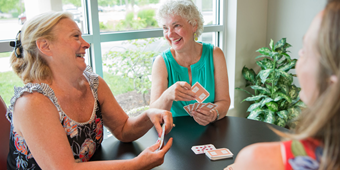Busting 8 Alzheimer’s Myths

Answer a few questions and we'll provide you with a list of primary care providers that best fit your needs.
More than five million Americans are living with Alzheimer’s disease, and the numbers are projected to increase greatly in the coming decades. Fear of losing our memory or identity may lead us to grasp at false ideas that cloud our knowledge of Alzheimer’s.
These myths tend to take people down wrong paths in understanding and managing the disease.
Separating fact from fiction about this devastating illness can help you take positive action for yourself and loved ones who are suffering from the disease.
One of the most important truths about interacting with people who have Alzheimer’s disease is that we need to value and respect people as they change. They’re not stupid, but their memory isn’t working well. Even though they can’t remember your name, you’re important to them.
Let's set the record straight about some common myths concerning Alzheimer’s disease:
Myth: Only seniors get Alzheimer’s disease.
Truth: Although the majority of people with Alzheimer’s are age 65 or older, people in their 30s to 50s can get early-onset Alzheimer’s disease.
Myth: You can’t die from Alzheimer’s disease.
Truth: Alzheimer’s is ultimately fatal, although another illness may cause death first. Alzheimer’s disease often begins with memory loss, problems with language and confusion about tasks of daily living. As it progresses over time, however, a person loses basic functions, including walking, talking and eating.
Myth: There are treatments that halt the progression of Alzheimer’s disease.
Truth: The drugs prescribed for Alzheimer’s disease are only able to slow disease progression for a time — and they don’t work for everyone. In addition, there is no conclusive evidence that supplements claiming to improve memory or brain health actually work.

Myth: Memory loss is a normal part of aging.
Truth: Small memory lapses such as not remembering a name or a word can occur as your brain ages, but if memory issues are disrupting your life, you should have a medical provider evaluate you.
Myth: Since there is no cure for Alzheimer’s, early diagnosis doesn’t matter.
Truth: Early diagnosis allows a person with Alzheimer’s to get maximum benefit from available treatments that may slow the disease and to make decisions about participating in clinical trials. The person with Alzheimer’s also has greater opportunity to plan and give input about future care. In some cases, a treatable illness may be causing Alzheimer’s-like symptoms such as memory loss.
Myth: Alzheimer’s affects genders and ethnic groups equally.
Truth: African-Americans are nearly twice as likely to have Alzheimer’s or other types of dementia. Hispanics also are at greater risk than other groups.
Alzheimer’s is a women’s issue. Not only are women more likely to get Alzheimer’s (partially because they live longer), but they also are more likely to be caregivers.
Myth: Aluminum cans and pots, aspartame artificial sweetener, silver dental fillings and flu shots all can increase a person’s risk of getting Alzheimer’s.
Truth: In fact, none of these have been proven to be associated with the disease.
Myth: There’s nothing I can do to reduce my risk of getting Alzheimer’s disease.
Truth: There are several lifestyle choices you can make to increase your brain’s health. Exercising, healthy eating, social interaction, and keeping mentally active all help your brain stay healthy longer.
Answer a few questions and we'll provide you with a list of primary care providers that best fit your needs.
Source: Alzheimer’s Association; Mental Health Treatment




